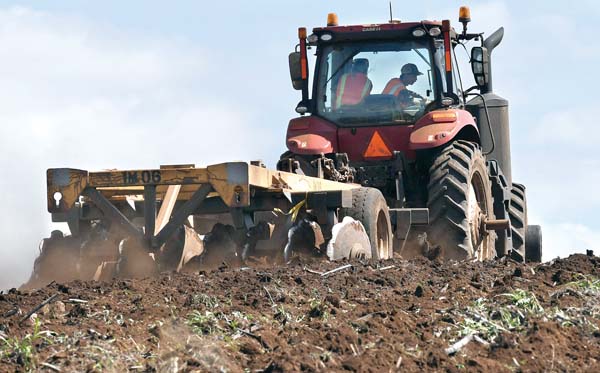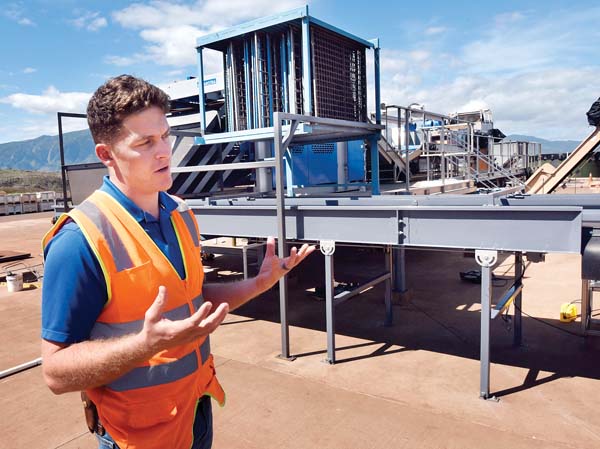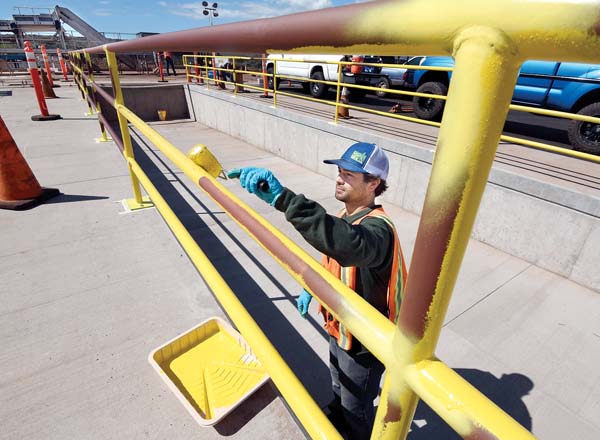
Mahi Pono workers remove old drip irrigation line from a former Maalaea sugar cane field Wednesday afternoon while preparing it for planting. — The Maui News / MATTHEW THAYER photo
PUUNENE — Mahi Pono this week unveiled a farm plan that will plant more than 700,000 trees in Maui’s central plains by the end of this year.
Also, company officials targeted March as the opening for its community farm project.
Mahi Pono, a joint venture between a California farming company and a Canadian pension fund, acquired 41,000 acres of former sugar cane land and half of the East Maui Irrigation water delivery system from Alexander & Baldwin a little more than a year ago. Since then, the company has been under scrutiny for its land and water plans.
Mahi Pono farm leaders said that while the transition from A&B’s history of monocropping of sugar cane to Mahi Pono’s large scale diversified agriculture plan may be questioned by some, the fruits of Mahi Pono’s labor are, quite literally, at stake.
Staff hailed the company’s capital investment in equipment, infrastructure and the hiring of more than 150 employees (130 are full time), all working to grow food for Maui.

A Mahi Pono tractor driver tills a field along Haleakala Highway on Wednesday afternoon. — The Maui News / MATTHEW THAYER photo
“We have seen this, year after year after year, decade after decade, with the closure of different large ag operations — it’s the commitment of capital into agriculture, which is inherently very risky,” said Jacob Tavares, Mahi Pono livestock and land development manager. “We are fortunate enough to have a company with the willingness to provide us with resources, experts, consultants, operators, trainers — that also rely on local know-how, a local understanding of the land and of the community.”
Mahi Pono Land Prep and Cultural Resource Manager Justin Teixeira said merging local and Mainland tools will yield state-of-the-art products.
“We’re providing safe food,” he said. “We’re not just trying to — we are.”
Teixeira and Tavares detailed the 2020 Mahi Pono crop plan, which includes the planting of hundreds of thousands of citrus, coffee and breadfruit trees by the end of the calendar year. Also, 2,000 acres of pastureland will be added to the company’s expanding grass-fed beef production.
This year’s plantings will add to crops already in the ground.

Jacob Tavares, Mahi Pono livestock and land development manager, explains how the company’s new potato handling and packing line works Wednesday. The line was bought used and moved to Maui from Colorado. A building currently is under construction to protect the machine. — The Maui News / MATTHEW THAYER photo
Mahi Pono’s signature crop, potatoes, will be regularly planted on 120 acres. Currently, the red, white and yellow potatoes are grown in Puunene. With crop rotation, they will be moved closer to Maui Humane Society in March.
Once the commercial potato harvest begins in mid-February, Mahi Pono is aiming to produce 50,000 pounds of potatoes per week. The company is in the process of building and enclosing a new potato processing plant and working through the “kinks that come with the harvesting, processing, packing and just getting a quality product into the marketplace,” Tavares said. The facility is in the vicinity of the Hansen and Pulehu road intersection.
Also in the ground are varietal onion trials in Puunene, along with papaya, more citrus and avocado.
Along boarders of fields within planting areas, hau windbreaks may be seen. They are strategically placed based on how much wind coverage farmers get from each break, Tavares said, adding that residents can see a row planted along Haleakala Highway in the Pukalani field.
Overall, the farm uses conventional methods and grows non-GMO crops. In the future, smaller sections may undergo the organic certification process, said Tiare Lawrence, Mahi Pono community relations director.

Mechanical engineer Tom Duarte of Himeq Mechanical Engineering paints a railing he built for Mahi Pono’s new potato handling and packing facility. Duarte said he traveled to Colorado to disassemble the used handling and packing line and then reassembled it at the Mahi Pono facility. — The Maui News / MATTHEW THAYER photo
Teixeira said Mahi Pono farmers are always looking at new crops, especially ones that can be alternated with the potatoes, which require rotation to ensure soil health. He added that crop choices are a collaborative effort.
“The whole Mahi Pono team plays a part in deciding what we plant,” he said. “Of course, you’re looking at the agronomic practices but also water delivery and everything else. So we have to take everybody’s input into consideration. We have a lot of knowledge here in this office.”
Aside from its own crop planting, Mahi Pono’s community farms are closer to opening.
Lawrence, who’s working on the project with Darren Strand, vice president of agricultural outreach and business development, said more than 100 applications were received last year, and they were narrowed to 25 farmers.
Currently, farmers are being interviewed on their farm plans by Mahi Pono’s Community Advisory Board, comprising Robert “Uncle Bobby” Pahia, Ryan Earehart, James “Kimo” Falconer and Vincent Mina.
Ten farmers will be chosen, and they will have “farm ready” land on 40 acres in Central Maui come March, Lawrence said.
Mahi Pono is providing fencing, wind breaks, irrigation, compost, cover crop and much of the initial tillage and land prep so farmers don’t have to buy or rent a large commercial tractor, Tavares said.
Mina said the community farm initiative cultivates a mentality of “supporting local ag — not using local ag.”
“They’re leasing these lands at $150 per acre per year,” said Mina, president of the Hawai’i Farmers Union United, Maui County representative on the state Board of Agriculture and Kahanu ‘Aina Greens owner. “A&B never did anything like that for the community.
“I value the fact that this company wants the community to have a stake in the local agricultural scene here.”
For water access this year, Mahi Pono can use an average of 45 million gallons a day (mgd) from East Maui, through A&B’s state-approved revocable one-year permit. Pending state Commission on Water Resource Management approval is an agreement with Hui o Na Wai ‘Eha, which would give the company access to 11.22 mgd of West Maui Mountains water.
* Kehaulani Cerizo can be reached at kcerizo@mauinews.com.
_______________
MAHI PONO 2020 CROP FARM PLAN AT A GLANCE
Crops already in the ground:
• Potato. 120 acres above Puunene Mill.
• Onion. 20 acres above Puunene Mill.
• Papaya. 22 acres above Puunene Mill; 16,000 trees.
• Citrus and avocado. 144 acres, near Maui Humane Society and Maui Veterans Highway; 20,000 citrus trees, 500 avocado trees.
Planting this year:
• More citrus (lime, lemon, orange, mandarin, tangelo, rootstock trials). 3,500 acres, corridor between Haleakala Highway and Pulehu Road; some will go into fields near Maui Humane Society and Maui Veterans Highway; 400,000 trees.
• Coffee. 240 acres below Pukalani off Haleakala Highway, 300,000 trees.
• Breadfruit. 15 acres across Spreckelsville, 500 trees.
• Pastureland. 2,000 acres between Baldwin Avenue and Maliko Gulch, grass-fed beef production.